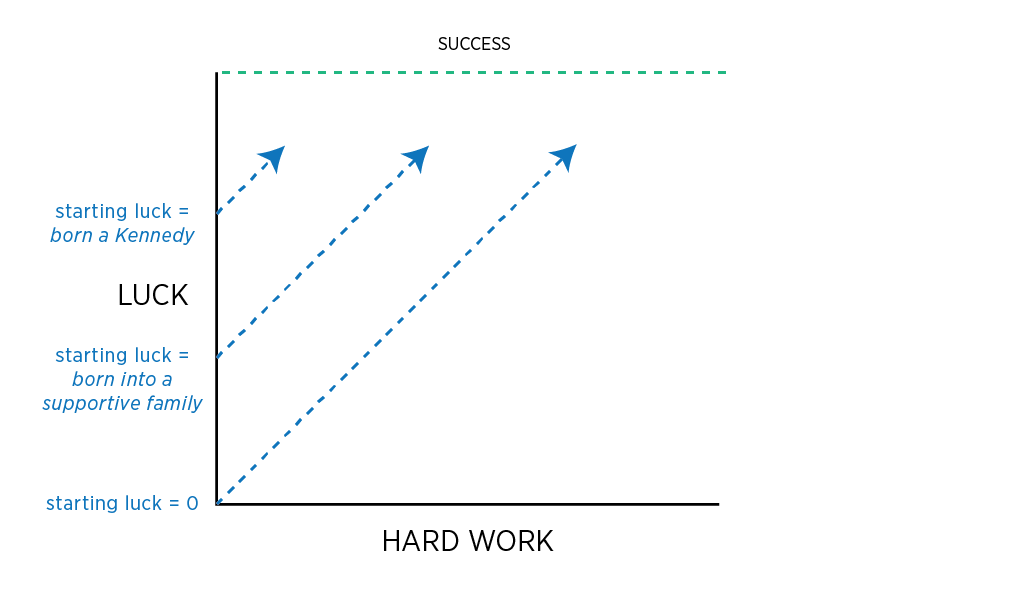
Luck vs. hard work is an age-old debate. We like to believe that our dreams are the product of hard work, but if that’s all it takes, there would be plenty more wildly successful people by our social standards. To get a more accurate picture, we must understand how hard work synergizes with luck. In this post, you’ll better understand how various factors determines success and how we can influence it to work for us. (Estimated reading time: 9-10 minutes)
“Luck is when preparation meets opportunity.”
— Seneca
Ask successful people about what made them rise to the top, and they’ll probably mention one or a combination of things like focus, dedication, preparation, hard work, and great ideas. Very few will admit that luck and privilege played a crucial role in their accomplishments.
We like to believe that our dreams are the product of hard work. If we keep going at it, eventually, our efforts will bear fruit. It also makes a good story, which is why we love characters like Rocky Balboa from the movie series “Rocky.”
While training to become a heavyweight boxer, Rocky faced a lot of ups and downs but never gave up. Through sheer determination, willpower, and self-belief, he pushed against the odds stacked against him, eventually blossoming into a champion.
His life is a metaphor for the path to glory. It demonstrates that no matter your goal or aspiration, you’ll never succeed until you get the work done and stay in the game. Rocky captures this philosophy of rigorous work ethic when he says:
“It ain’t about how hard you hit. It’s about how hard you can get hit and keep moving forward; how much you can take and keep moving forward. That’s how winning is done!”
Many studies support the idea that talent, a growth mindset, and willpower give you a fighting chance to become accomplished. But is that all it takes? If it were, there would be plenty more wildly successful people by our social standards.
We’ve minimized or ignored the role that luck plays in getting people to where they are today. Time and time again, we see advantages that provide certain people with a head-start and the serendipitous events that give them a leg up or ease their path. To get a more accurate picture of the luck vs hard work debate, we must understand how hard work synergizes with luck in shaping a person’s destiny.
Winning the ovarian lottery: how the circumstances we’re born into impact luck

I recently came across an interesting perspective on luck from Warren Buffet, one of the wealthiest people in the world. The famed investor coined the term “ovarian lottery,” which speaks to the idea that the circumstances of a person’s birth influence their opportunities in life.
According to Buffet, before you come into the world, you will pick one ball out of 6.8 billion (the world population at the time). That ball will determine your race, gender, natural abilities, health, and nationality. Whether you are able-bodied, intelligent, physically attractive, poor, below average, a member of a dysfunctional family, or a citizen of a country with few opportunities.
This random selection is what Buffet refers to as the ovarian lottery. “You’re going to get one ball out of there, and that is the most important thing ever going to happen to you in your life,” he explained to a group of University of Florida students. However, he didn’t say this to disempower his pupils; rather, his intention was altruistic.
Buffet believes this outlook can make us more empathetic toward those less fortunate, i.e., those who received a less favorable ball. He says we should design a society that “doesn’t leave behind someone who accidentally got the wrong ball and is not well-wired for this particular system.”
Privilege is another term to describe the advantages we get from winning the ovarian lottery. Privilege comes from the Latin word “privilegium,” which means “a law for just one person, a benefit enjoyed by an individual or group beyond what is available to others.”
Those lucky enough to be born into wealthy families (or healthy and supportive ones), with good looks, or of a particular race or ethnicity make it possible for them to go farther in life than those who didn’t find themselves in beneficial circumstances.
This does not mean those who fit into these privileged molds do not deserve the success they’ve earned. Nor does it mean they should feel guilty for their achievements. It simply means that they should appreciate the extent to which their hard work was bolstered by their privilege.
Privilege is like having a propeller that accelerates your growth and possibilities. Those born into fortunate circumstances find it easier to inherit an abundance mindset. Knowing that the world is their oyster and not having to worry about resources attracts more opportunities into their world.
Whenever I consider my privilege, I feel immense gratitude. My access to education, freedom, and a comfortable lifestyle is something the women in my family lineage and some of my relatives could not even dream of. Just like me, there are privileges from which you benefit, and you must recognize their role in who you’ve become and use that power for good.
Luck, however, is not limited to the circumstances of your birth. So many other ingredients go into the mix, some of which are under our control and others not.
Being at the right place, at the right time: the role of timing and chance in luck

Starting your life with a lucky ball does not guarantee long-term success and happiness. What happens after that is just as important (if not more so). Being at the right place at the right time creates sliding door moments that can alter the trajectory of our lives if we step into them.
Luck is especially crucial in chance encounters with important people in our lives – a dear friend, the love of your life, a mentor, or a business partner. If you trace back the events that orchestrated your meeting with these special connections, the role of serendipity is undeniable.
It’s not that those seeking meaningful relationships are doing something wrong or are less worthy of having them — they just haven’t had the fairy dust of luck sprinkled on them (yet). So, if you’re unhappily single or haven’t met that coveted professional connection who will open doors for you, don’t beat yourself up — acknowledge your efforts and keep moving forward.
Author and journalist Michael Lewis says that luck makes the difference between successful and unsuccessful people, even if they are equally talented and are just as confident and competent. Lucky breaks, however, only become lucky if we act on them. You’re not going to hear angels sing or drum rolls playing — you must recognize and grab them when the opportunity presents itself.
The bottom line is that we can’t deny that there are things that will happen, good or bad, without our influence, and it’s up to us to see this in a positive or negative light. Lady luck decides who enters our lives, but we can be proactive by placing ourselves in situations where she can find us and make magic happen.
Luck vs hard work: what really determines success

Both hard work, timing, and luck matter in shaping our destinies, but each plays a different part in different types of success. In his article on luck, author James Clear writes that “luck matters more in an absolute sense and hard work matters more in a relative sense.”
When viewed through the lens of absolute success, you compare yourself to everyone else in the world. If you’re one of the best in a particular field, luck plays a significant role in success. In general, the more extraordinary the win, the more unpredictable the things that favored you are – this can range from the right connections to the right genes.
Relative views look at your success compared to those like you — those who lived in the same area and were born with similar levels of talent and education. The more local the comparison, the more weight hard work has in the success equation. What sets you apart from those with similar backgrounds and circumstances is the habits and choices you make.
Daniel Kahneman, a psychologist notable for his work on the psychology of judgment and decision-making, said something similar about luck vs hard work. He believes that talent (exceptional skills and abilities) and effort (focus, persistence, and hard work) are catalysts for the success of others. Some people have stronger predispositions for this behavior.
Like Clear’s theory on absolute and relative success, Kahneman noted that different degrees of talent and luck are required for varying levels of success:
Success = talent + luck
Great success = a little more talent + a lot of luck
This is both good news and bad news. The bad news is that luck and timing are not under our control, and success is not a guaranteed by-product of talent and effort.
The good news is that we can increase our odds by working hard and building our lives in a way that attracts the right opportunities. This gives us more agency in our futures and motivates us to forge ahead.
We choose whether to be victims who surrender to their fate, or leaders who take action and make the best use of everything we have. Even if success is slow and sporadic, we build character and wisdom along the way, which can lead to treasures that money can’t buy.
How to increase luck in your life

In the luck vs hard work equation, luck is not something that we can predict or control. Even so, knowing how it works can help us influence and prepare for when it happens. That’s precisely what Richard Wiseman, psychologist and author of “The Luck Factor,” did.
His research showed that people who believe they are lucky and have experienced numerous strokes of luck have a certain mindset.
There are four principles that they tend to follow:
- They create, notice, and act upon chance opportunities and take planned risks
- They are open to new things, expect good things to happen to them, and live in a state of positive anticipation (which often becomes a self-fulfilling prophecy)
- They find ways to turn failures into success and persevere even if the chances of finding success are slim
- They listen to their gut feelings when making decisions
In addition to these four principles, there are other things you can do to boost your luck:
1. Follow your passions and personal values: When you do things you’re enthusiastic about, you’ll be more actively engaged in pursuing and growing your skills and talents. Your intense interest and your focused efforts in actualizing them will draw the right people and opportunities to you.
2. Build on your experience and keep learning: The more you know about the granular details of any issue, the easier it will be for you to anticipate things like good timing and the right people to connect with. Warren Buffet’s unprecedented success in investment is due to his natural talent, which he strengthened with experience and knowledge.
3. Take action and persist in your efforts: Taking measured steps can propel you toward luck. That could mean changing jobs, moving countries, or breaking away from a toxic relationship. Novelist Johann Wolfgang von Goethe famously said, ‘Whatever you think you can do or believe you can do, begin it. Action has magic, grace, and power in it.’ If you break unhealthy patterns and go in a favorable direction, you’re more likely to encounter luck.
4. Metaphysical and spiritual tools: With the rising popularity of the New Age movement, there are several metaphysical techniques that believers have added to their manifestation toolboxes. This can range from visualization, the law of attraction techniques, and collecting crystals, Feng Shui objects, and lucky charms. Acting during opportune times based on astrological cycles is another popular practice. While no scientific evidence proves their effectiveness, many followers believe in their potency in attracting luck.
Luck is not as elusive as we think it is. We can feel lucky at any moment and under any circumstance. All we need to do is live in a state of gratitude. When you genuinely appreciate everything you have in your life, both big and small, you’ll realize that you’re lucky beyond measure – and the luck vs hard work debate does not really matter.
All my best on your journey,
Seline

Question for you: Where do you stand in the luck vs. hard work debate? How have these two factors played out in your life and what did you learn from your experiences?
Did you like this post? Sign up below, and I’ll send you more awesome posts like this every week.

Great article! This post is incredibly helpful and reliable.